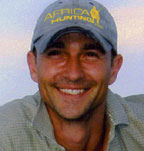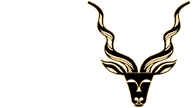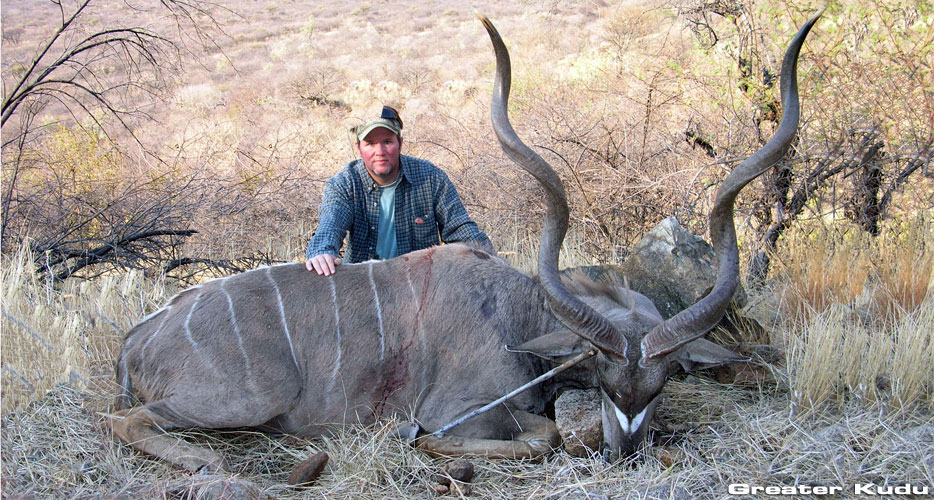
Your Namibia Hunt
Quick links to sections below…
Your Hunting Safari in Namibia →
Map of Namibia with Ozondjahe Hunting Safaris →
Namibia Hunting Season and Climate →
Our Hunting Team and Vehicles →
Arms and Ammunition →
Hunting License and Permits →
Field Preparation of Trophies →
Dip Pack and Taxidermist →
Trophy Shipping Agent →
Shipping & Importing Your Hunting Trophies Back →
Permits and Importation Procedures for Trophies →
U.S. Fish & Wildlife and CITES Permits for Trophies →
CDC for Baboon and Warthog Trophies →
General Information about Hunting in Namibia →
Your Hunting Safari in Namibia ←
Every hunting safari at Ozondjahe Hunting Safaris in Namibia is tailored to your wishes. To learn all about us click here to visit our Home page. Our terrain and trophy species are so varied that we prefer to customize your hunting safari to fit your individual priorities. Once you have decided on the species you wish to hunt we will recommend the number of hunting days to meet your expectations for the variety and quality of hunting trophies you desire. On average, plains game hunting safaris as well as bowhunting safaris are usually between 9 to 12 hunting days, however we have no minimum number of hunting days required. Predator hunting for Leopard and Cheetah require a minimum of 12 hunting days (13 nights in camp).
Please continue scrolling down the page to read more…
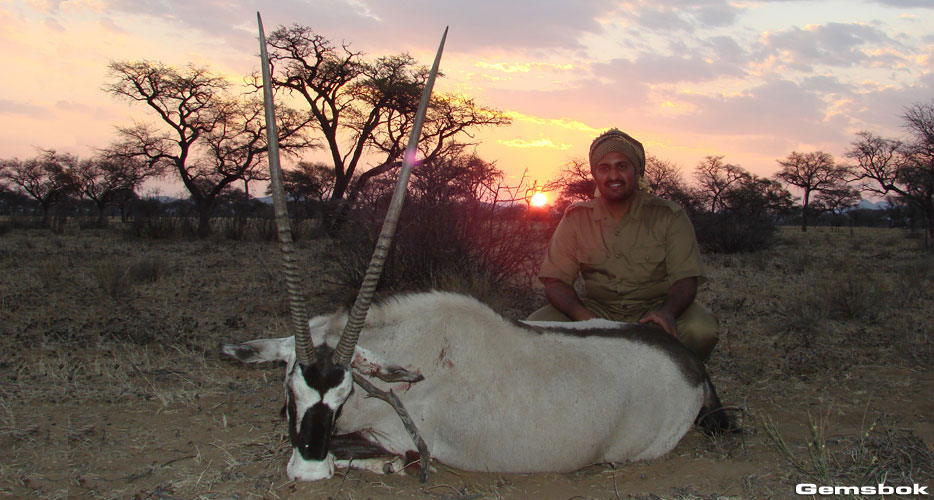
Each hunt is adapted to provide choice and variety of safari hunting methods, including bow hunting safaris. According to your quarry, preliminary spotting may be done by 4×4 vehicle with closer approach on foot, the spot and stalk hunting technique, stalking and tracking, baiting for Leopard hunts, waiting from one of thirty strategically located permanent blinds or from a makeshift hide. For more detailed information about bow hunting safaris, click here for our Bow Hunting page.
We welcome non-hunting friends and family, up to 14 people total and can organize outings and activities for guests when not accompanying the hunting party, click here to see our Activities and Tours section.
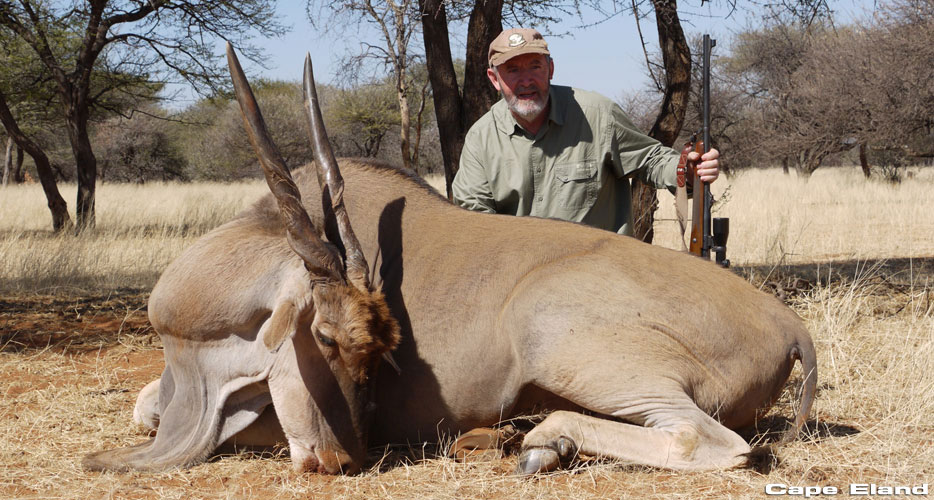
Map of Namibia with Ozondjahe Hunting Safaris ←
Our hunting territory is located in a malaria-free zone in the central region of Namibia (Otjozondjupa Region). Ozondjahe Hunting Safaris territory neighbors the Waterberg Plateau National Park, renowned for its multitude of rare and endangered species and majestic beauty.
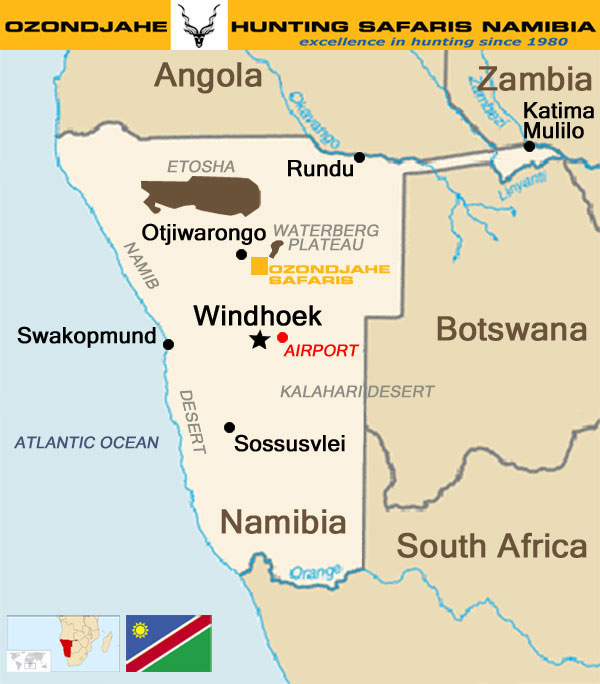
Map of Namibia Showing the location of Ozondjahe Hunting Safaris
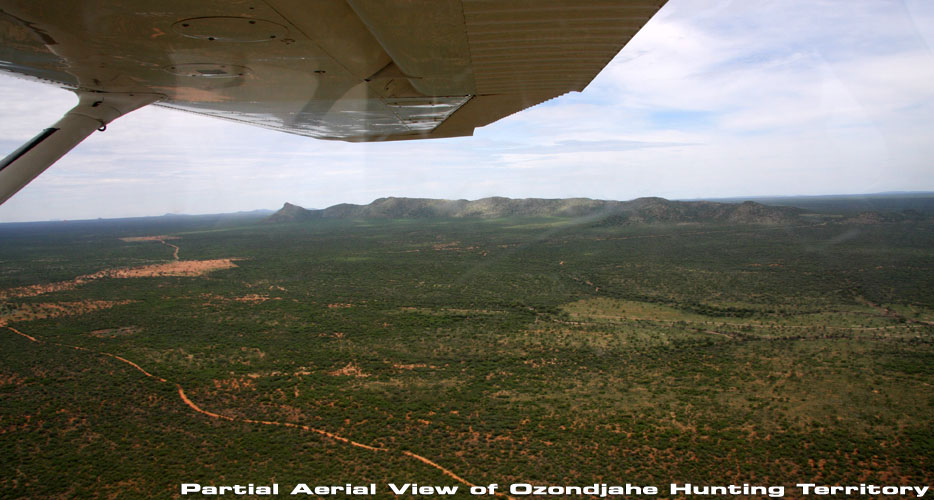
Namibia Hunting Season and Climate ←
Our trophy hunting season in Namibia opens in February and runs through November, being 10 months long it incorporates each of the four seasons. There are no particular months when plains game hunting is necessarily better, but time constraints or personal considerations such as weather, touring, wingshooting, bow hunting or specific seasonal activities might make a certain period of time more desirable to you. Keep in mind while pondering your dates for hunting in Namibia, that seasons in Namibia, since we are in the Southern hemisphere are opposite of those in the Northern hemisphere.
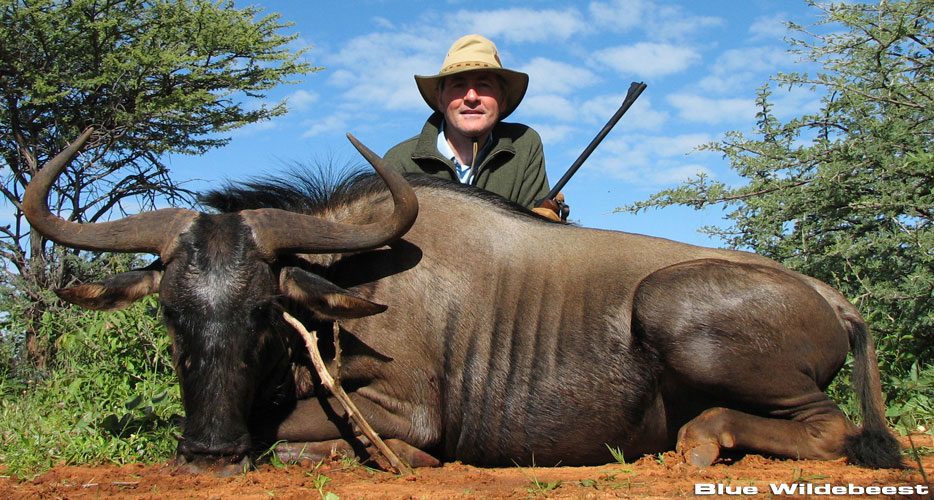
Located in the central high plains of Namibia at an elevation of 5200 feet (1600 meter), the temperature range can be rather extreme, typically varying 35° F (20° C) between daily highs and lows. During the early months of the hunting season, February to April, the occasional rainstorm can disrupt the clear sunny skies; although there may be heavy showers they are usually short in duration and typically occur in the late afternoon or evening.
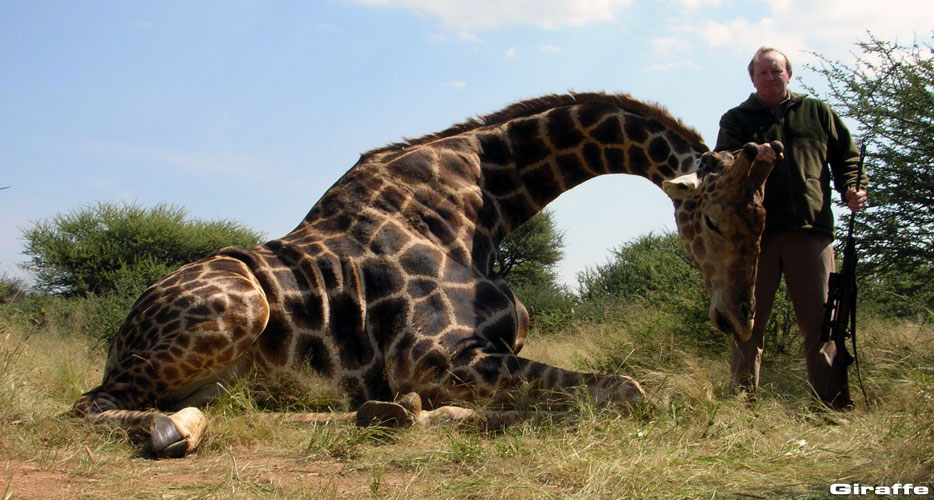
The climate in Namibia is quite pleasant, we have low humidity and dry heat is much more tolerable and more conducive to hunting than is the case in most other destinations for hunting in Africa. Another benefit of the arid climate in our specific region is that Ozondjahe Hunting Safaris is in a malaria-free zone. With an absence of mosquitoes carrying malaria or yellow fever and no tsetse flies, overall we have a low insect population for Africa, which makes Ozondjahe a safer destination for hunters who wish to bring their family. To properly prepare for your hunt in Namibia, click here to visit our Travel Information page.
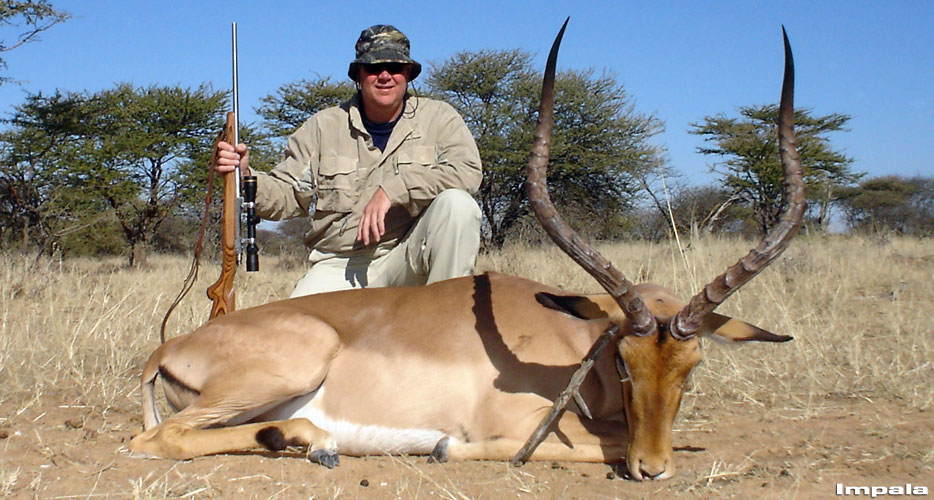
| Average Low/High Temperature | ||||||||||||
|---|---|---|---|---|---|---|---|---|---|---|---|---|
| Month | Jan | Feb | Mar | Apr | May | Jun | Jul | Aug | Sep | Oct | Nov | Dec |
| F° | 63/90 | 63/86 | 61/84 | 55/84 | 48/81 | 43/75 | 43/75 | 46/81 | 55/88 | 57/90 | 61/91 | 61/93 |
| C° | 17/32 | 17/30 | 16/29 | 13/29 | 9/27 | 6/24 | 6/24 | 8/27 | 13/31 | 14/32 | 16/33 | 16/34 |
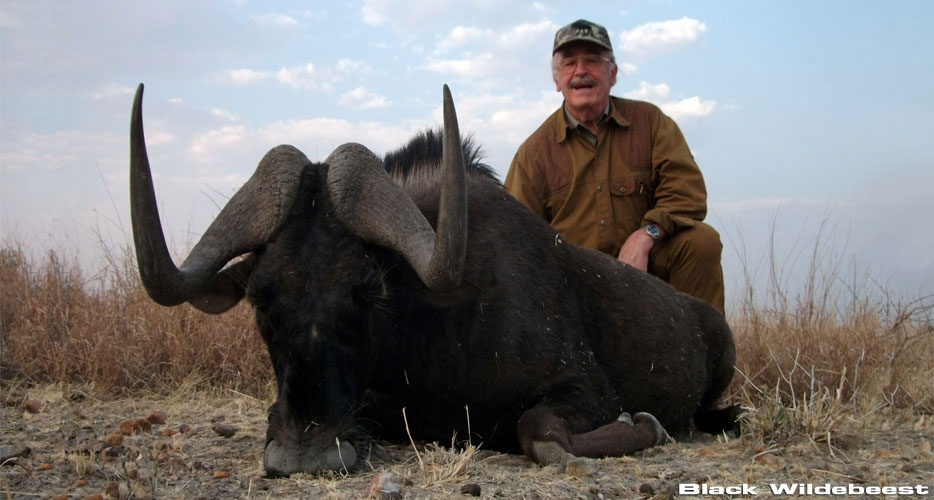
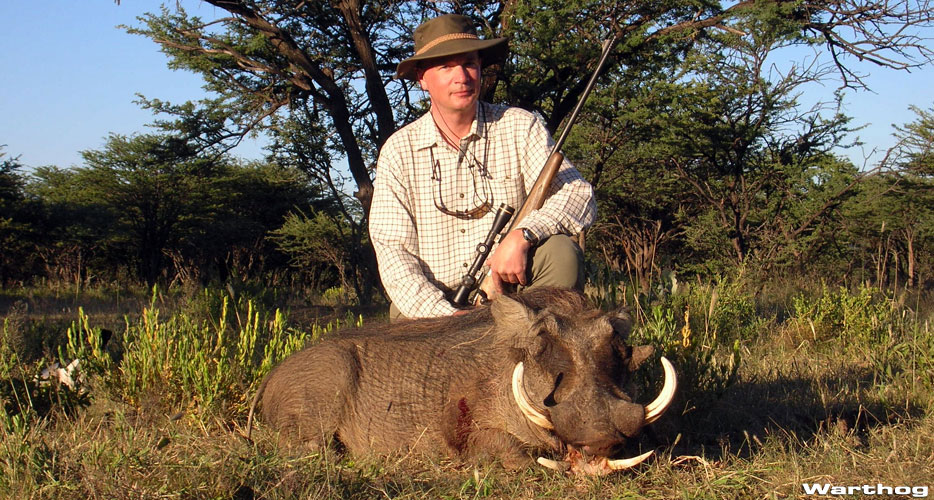
Our Hunting Team and Vehicles ←
As a top outfitter in Namibia, Ozondjahe Hunting Safaris has a complete team of full time professional hunting team and staff, including two highly accomplished, licensed Professional Hunters, assisted by our longtime native trackers, skilled skinners and drivers.
Our Professional Hunters primary goal is to provide you with the finest quality hunting trophies and exceptional personal service in every aspect to ensure that you have a once in a lifetime African hunting safari adventure.
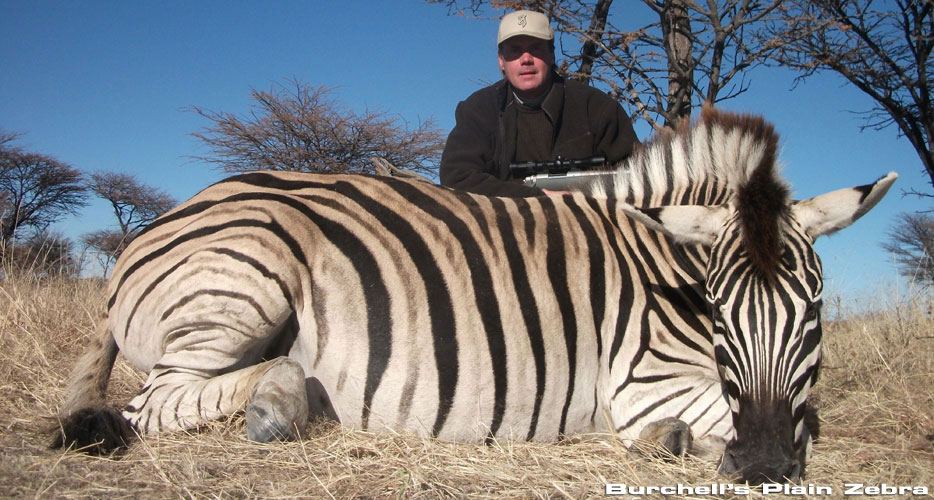
Our professional hunting team’s hard work, integrity, understanding and bond with nature are crucial assets to the African hunter and key to a rewarding and successful trophy hunt. Our Professional Hunters are not only committed men, they are experts in the field and superb judges of game trophy quality but most importantly possess great practical experience and speak several languages including English. Carefully selected freelance Professional Hunters, familiar with Ozondjahe Hunting Safaris territory, are available for larger hunting parties requiring more than two Professional Hunters.
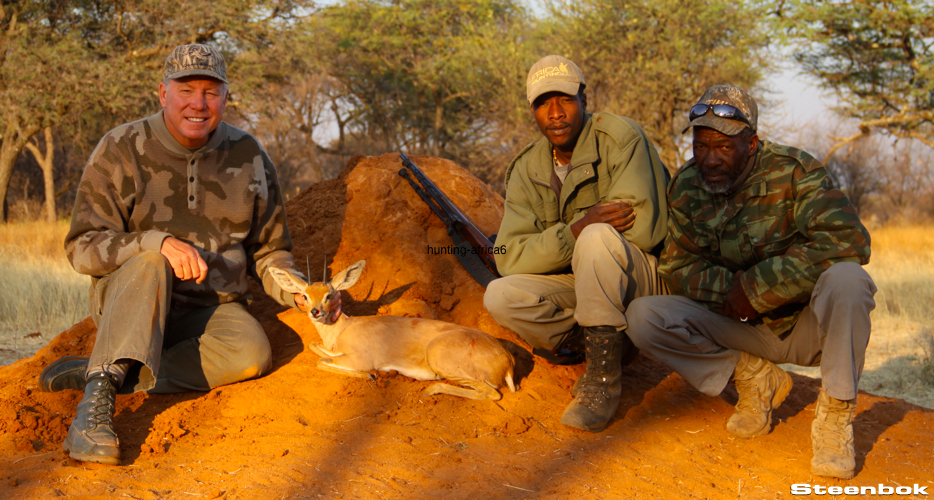
To ensure a trouble free and safe hunting safari, we have six reliable well-maintained and fully equipped four-wheel drive vehicles which are used for hunting as well as backup vehicles. All of our open-vehicles have radio capability throughout the game reserve, are customized particularly for comfort and hunting purposes and carry a first aid kit. Cool boxes containing water and other refreshments and snacks will be brought along on each vehicle for your needs and enjoyment.
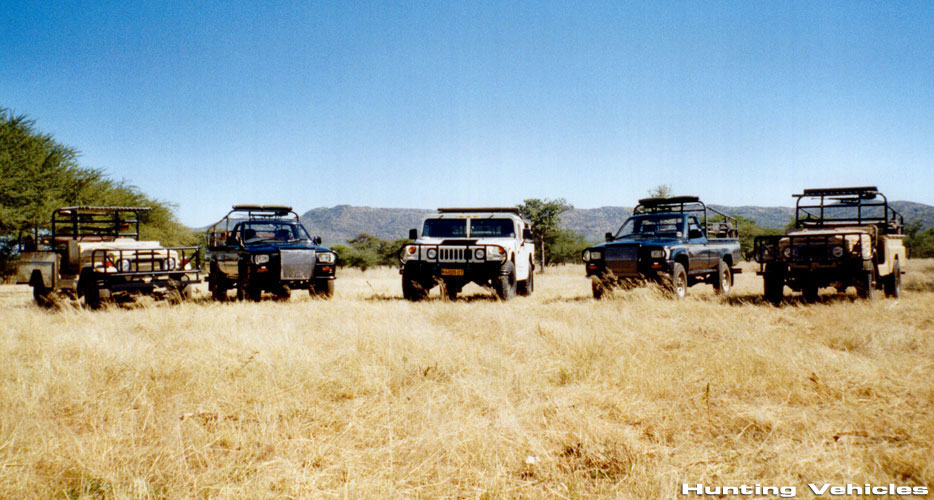
Arms and Ammunition ←
While most shots are taken from within an average of 110 yards (100 meters), they can range from fairly close in thicker bush to relatively long distances up to 250 yards (230 meters) on open plains, so a good variable scope is suggested, you may also consider bringing a shooting stick or you can use one of ours.
We encourage you to bring your own rifle which you are the most comfortable and proficient using. If you are unable or do not wish to travel with your own firearm we have a selection of rifles and shotguns in different calibers that are available for rental by the day. Rifle sight-in will be done prior to the commencement of your hunting safari at our well equipped 100 yard (100 meter) shooting range to ensure your rifle shoots properly before you go in search of that dream trophy.
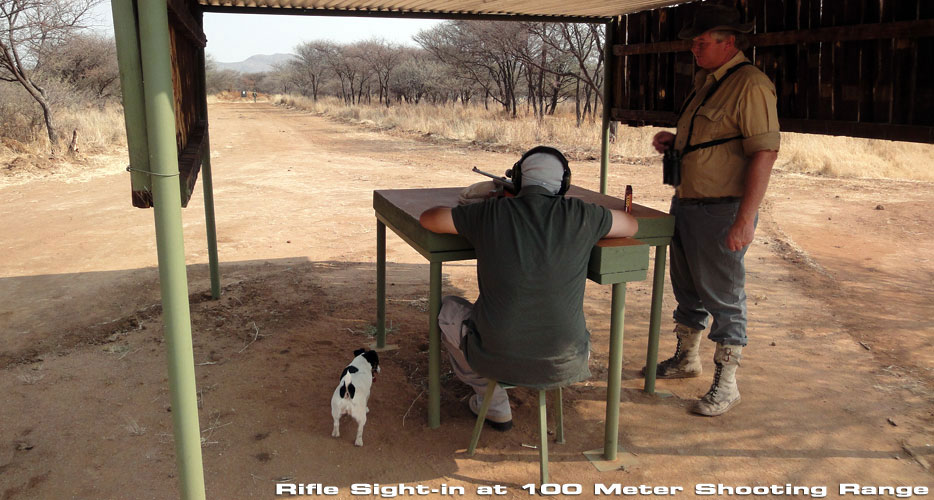
Depending on how many animals you aim to shoot, about sixty rounds of ammunition per caliber should be sufficient for a twelve-day hunt. One hundred rounds of ammunition per firearm is the maximum allowable. We think it best that you bring some type of wearable rifle cartridge carrier.
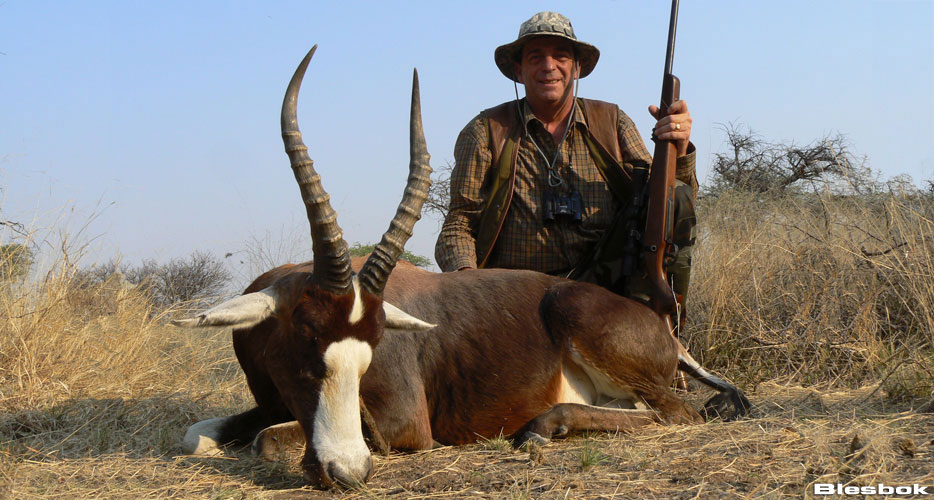
Good shot placement is more important than rifle power. Any caliber .270 or higher may be used for most plains game hunting but we strongly recommend a rifle well suited for African antelope such as a .300 Winchester Magnum, 338, 7mm, 30-06 or similar caliber rifle or higher with premium soft nose ammunition. Ammunition choice of bullet should be swift-A Frame, Woodleigh, Barnes X, Nosler partition or Hornady soft nose. A good quality variable rifle scope with a 3×9 power will be adequate. Handguns, automatic weapons and solid point cartridges are not permitted in Namibia.
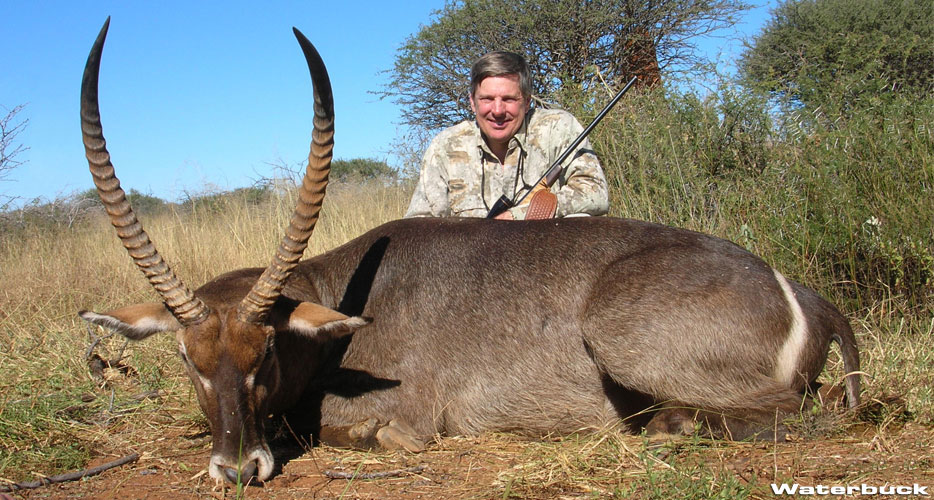
Hunting License and Permits ←
Once your hunting safari has been confirmed, Ozondjahe Hunting Safaris will obtain your hunting license and hunting permits on your behalf. For us to apply on your behalf for these documents, the Hunting Application Form must be filled out by you and sent to us well before the commencement of your hunting safari. It may be completed and submitted to us online by clicking here.
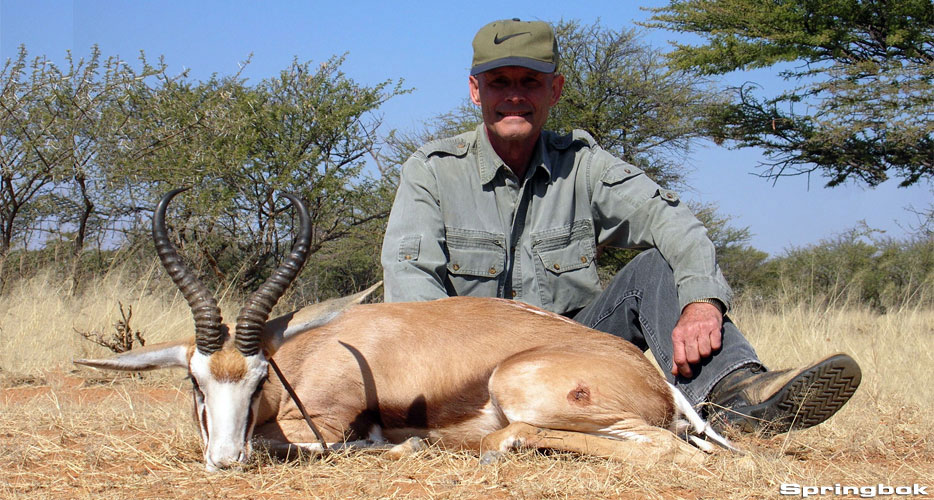
Namibian law states that a hunter may take only two animals of each species per year on a regular trophy hunting permit, irrespective of if the trophies are exported or not, a hunter may harvest more than two animals of each species on a management hunt.
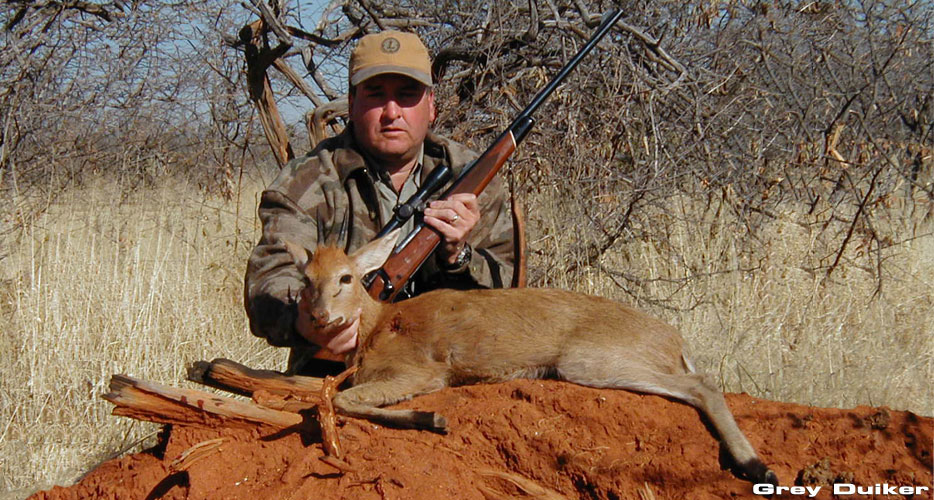
Field Preparation of Trophies ←
The field preparation of trophies (skinning, salting, drying and tagging) is included in our daily rate prices as well as normal transport of your trophies to our local taxidermist in Namibia, Taxidermy Studio & Tannery in Otjiwarongo. On rare occasions a special trip to the taxidermist may be required, for instance for transport of a Giraffe skin that cannot wait to be treated, then an extra transport fee might be charged by the taxidermist. With many years of experience refining their skills, our skinners working under the guidance of your Professional Hunter will ensure that each of your hunting trophies is prepared to your specifications and treated with the exacting care it deserves.
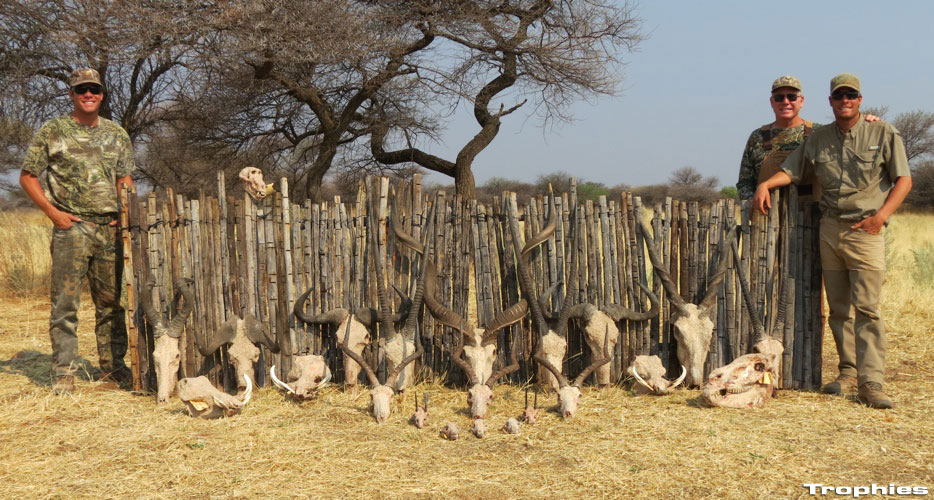
Dip Pack and Taxidermist ←
You may choose to have your African taxidermy work done in Namibia, partially or fully, or you can have it sent to be done by your own African animal taxidermist. What ever you decide your hunting trophies will be taken to a taxidermist in Namibia for processing, after the first preparation of your hunting trophies which is done at Ozondjahe Hunting Safaris. It usually takes us anywhere from 3 to 4 weeks to be finish with the first preparation of your trophies and have them delivered to the taxidermist. Should you not be doing your trophies’ taxidermy work in Namibia, we recommend that you bring to Namibia your taxidermist’s contact information along with their trophy tags, which your taxidermist should easily be able to supply you with. Laminated trophy tags labeled with all relevant delivery information including your name, specific wildlife port of entry in the US, and final shipping destination with full contact information (usually the taxidermist or you). Your taxidermist should be the one to provide these ready made tags to you well prior to your trip, and they should also give a couple of copies of this information to you on paper to give to us.
Once the taxidermist has your trophies, they will contact you to confirm your order for the work to be done and request payment. Payment to the taxidermist is done by wire transfer directly to them, usually a month or so after you have returned from your hunting safari. The taxidermist will then process your trophies for exportation into the country of destination which will be done through the shipping agent. Once the work by the taxidermist is done, the shipping agent will be contacting you for payment (see next section).
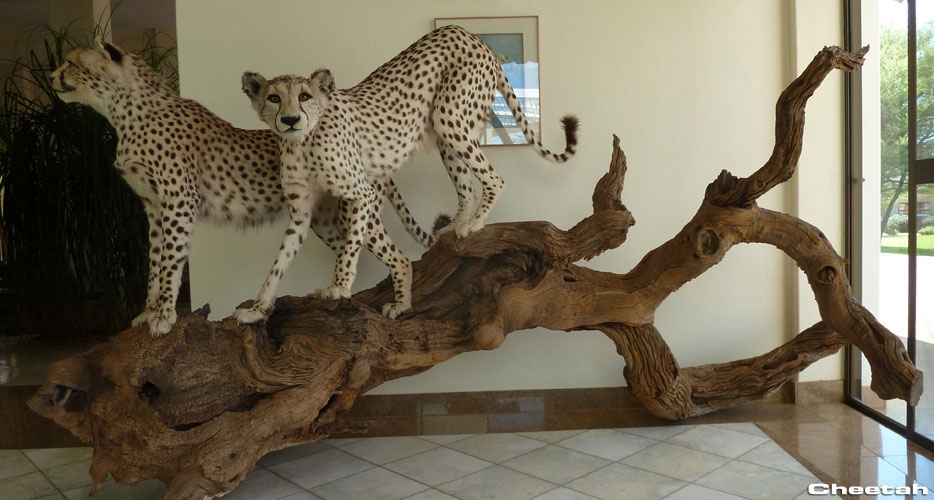
Trophy Shipping Agent ←
In regard to the shipment of your hunting trophies, we refer our clients to African Shipping Services to ensure that they are handled and shipped with care so that they reach their destination safely. Owner and manager of African Shipping Services, Rainer Sentefol has many years of experience in the Namibian transport industry and consistently provides high customer service, expert advice and competitive pricing, since every shipment is unique, they constantly source the most beneficial rates for you.
African Shipping Services’ storage facilities have been specially built to ensure that your hunting trophies are kept safe and secure. Shipping is their core business and they are focused on hunting trophy shipping in particular.
Once African Shipping Services has received your hunting trophies from the taxidermist in Namibia, they will be stored in their warehouse for safe keeping until such time that they are ready to be shipped. You will be contacted by them with shipping costs, proposed routing and they will confirm with you that all shipment details are correct. You can also inform them of your preferred agent and customs broker. Once you have agreed with the arrangements, they will obtain the necessary paperwork such as Export Permit, CITES, Health Certificate, Transit Permits and Certificate of Origin. Throughout the whole process they will be in touch with you via email or phone.
Depending on the type of shipment, once the payment is processed, and you give the final go ahead and all paperwork is completed, they will do the final preparations for dispatch, for instance Insurance, Flight Bookings, Waybills and Customs Clearance. They personally deliver your hunting trophies to the airport of departure and will notify you once more when your hunting trophies are safely on their way.
Feel free to contact African Shipping Services to check for your closest Port of Entry and find out if ocean freight is a viable option to ship your trophies. African Shipping Services has a longstanding relationship with most major shipping companies, clearing agents and customs brokers worldwide that specialize in the transportation, distribution and clearing of hunting trophies in your home country. If you prefer to consign your hunting trophies to your own clearing agent with whom you have a working relationship, please feel free to advise them accordingly. If not specifically included in your shipping quote, clearing fees and delivery charges from Port of Entry are payable by you.
Should you want detailed information, or a quote for the shipping of your trophies to the country of destination you can find their contact information below. African Shipping Services is the shipping agent in Namibia that we have been working with for several years and that we refer to our clients.
African Shipping Services
Mr. Rainer Sentefol
email rainer@africanshippingservices.com
website www.AfricanShippingServices.com
tel 264 (61) 305.821
fax 264 (61) 309.822
cel 264 (81) 306.3025
Shipping & Importing Your Hunting Trophies Back ←
I highly recommend that when it come to the intricacies of importing your hunting trophies do yourself a favor and hire experts to facilitate the process. Allan Zarach from TROPHY SHIPPERS (www.trophyshippers.com) offers an incredible service at a great price.
TROPHY SHIPPERS is a family owned company and have been in business since 1981. They are a customs brokerage and freight forwarding company that is dedicated to helping hunters quickly and efficiently get their hunting trophies home. They know what your hunting trophies mean to you, because they are a family of hunters themselves. If you have trophies that you need brought back to the United States or are planning a trip to Africa to hunt or anywhere in the world, let TROPHY SHIPPERS handle all of the paperwork, clearances, and shipments for you!
They truly provide an invaluable full service for managing an increasingly more detailed and complex process for the importation of your trophies from start to finish. If you would like to contact them, TROPHY SHIPPERS can be reached at Cell/WhatsApp +1 (847) 927-0101 / Office +1 (630) 595-7300, or via their website www.trophyshippers.com, click here.
Permits and Importation Procedures for Trophies ←
All trophy importation permits from country of residence are the hunters’ responsibility to obtain; we are unable to apply for them on your behalf.
Laws and regulations pertaining to permits and importation for sport hunted trophies may change, therefore this article includes links to send you directly to the source rather than supply you with information that could be out of date.
Some species may not be able to be imported back into your country of residence or whatever country you intend on importing your trophies into. You can find information on the importation of sport hunted trophies for the United States at the U.S. Fish & Wildlife Service at https://fwsepermits.servicenowservices.com/fws?id=fws_index or the Convention on International Trade in Endangered Species of Wild Fauna and Flora (CITES) at https://www.cites.org. For other countries’ importation regulations please refer to their appropriate agencies.
It is legal to hunt a Cheetah and Black-Faced Impala in Namibia; however please note that the USA does not permit the importation of Cheetah and Black-Faced Impala hunting trophies. Canada, many countries in South America, Mexico and most countries in Europe, such as Spain and France will permit the importation of a Cheetah and Black-Faced Impala trophy.
Hunters must be identified on their hunting license and hunting permit by their full name as it appears on their passport. A copy of the passport of a trophy hunter must be attached to the application for a predator trophy hunting permit.

U.S. Fish & Wildlife and CITES Permits for Trophies ←
All trophy importation permits from country of residence are the hunters’ responsibility to obtain; we are unable to apply for them on your behalf.
The import, export, or re-export of a number of sport hunted trophies may be regulated by a conservation law or treaty, which is implemented by the U.S. Fish & Wildlife Service, and requires a permit. This regulation is part of domestic and international conservation efforts to protect wildlife subject to international trade. You can find up to date information on the importation of sport hunted trophies, how to obtain a permit, as well as instructions on how to fill out the application by going directly to U.S. Fish & Wildlife Service at https://fwsepermits.servicenowservices.com/fws?id=fws_index.
The importation of particular sport hunted trophies requires a CITES permit (i.e. African Elephant, White Rhinoceros, Leopard, etc.), you will need to submit an application to the U.S. Fish & Wildlife Service. You can download the CITES permit application forms at https://www.fws.gov/service/3-200-20-import-sport-hunted-trophies-under-cites-and-esa. CITES stands for Convention on International Trade in Endangered Species of Wild Fauna and Flora, visit their web site at www.cites.org.
Should either of the above links be broken visit the home page of U.S. Fish & Wildlife Service at www.fws.gov and just simply browse through their web site to find the link to the permit page.
Here are a few resources from the U.S. Fish & Wildlife Service which you might find interesting:
Import of Sport-Hunted Trophies under CITES and the ESA
Import of Sport-Hunted Trophies of S.A. Leopard & Namibian S.W. Rhinoceros
Here are a few resources from CITES which you might find interesting:
How CITES works (the species covered by CITES are listed in three Appendices according to the degree of protection they need)
The CITES Appendices
Appendices I, II & III
CITES Species Database (search species by country)
Residents of other countries should consult their local CITES Permit agency or refer to their appropriate agencies.
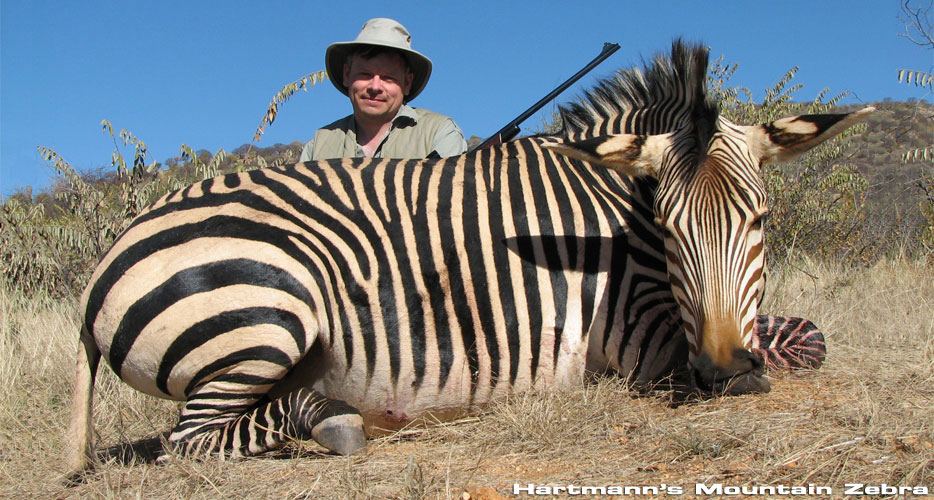
Center for Disease Control for Baboon and Warthog Trophies ←
All trophy importation permits from country of residence are the hunters’ responsibility to obtain; we are unable to apply for them on your behalf.
For hunters wishing to import or transport primate trophies such as Baboon, skin or skull that has not been fully taxidermied or treated so that it is non-infectious, you will need to get a permit to import or transport etiologic agents hosts or vectors of human disease from the Center for Disease Control & Prevention (CDC) Etiologic Agent Import Permit Program. Fully taxidermied or treated Baboon trophies will not require such permit for importation into the United States.
Unworked dipped Baboon (primate) and Warthog (swine) trophy parts have to be packed separately.
They can however be;
shipped together (in it’s own package) as an extra package with the main consignment OR
integrated in it’s own package within the larger main consignment – as long as it is packed separately – contamination free – and marked accordingly. The local taxidermist should be aware of the special shipping conditions applicable to both primate and swine trophies.
You can find up to date information on the import or transport of etiologic agents hosts or vectors of human disease, how to obtain a permit, as well as instruction on how to fill out the application by going directly to the Center for Disease Control & Prevention (CDC) Etiologic Agent Import Permit Program at www.cdc.gov/od/eaipp/ or visiting the links below.
Bringing Animal Products into the United States
CDC Import Permit Applications Forms
CDC Guidance for Importation of Non-Human Primate Trophies
CDC Frequently Asked Questions about Etiological Agent Import Permits
Residents of other countries should consult their local agencies.
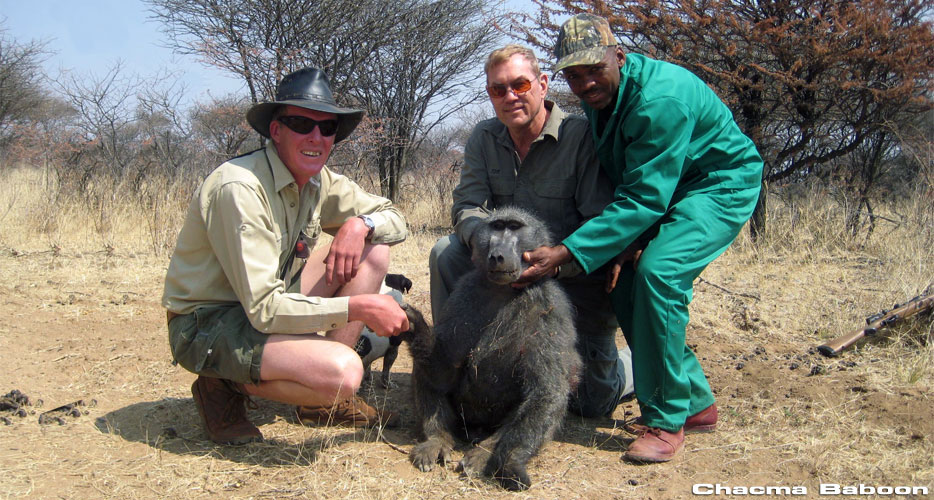
General Information about Hunting in Namibia ←
Namibia, formerly known as South West Africa, has a rich and interesting history. At one time the British Empire took partial possession of Namibia and later the Germans colonized the country until the First World War. Namibia was then placed under the administrative rule of South Africa and was finally granted independence on March 21, 1990.
Since independence, Namibia has benefited from great political stability. It is an easy, safe and affordable hunting destination for a great plains game hunting safari up to a high end big five hunting safari. This is why it is so popular amongst hunters, second only to South Africa in the numbers of hunters who visit annually, averaging more than 5,000 international hunters per year. Namibia has become a favorite destination for first time hunters, family groups of hunters as well as long time African hunting veterans who appreciate the benefits of hunting in Namibia.
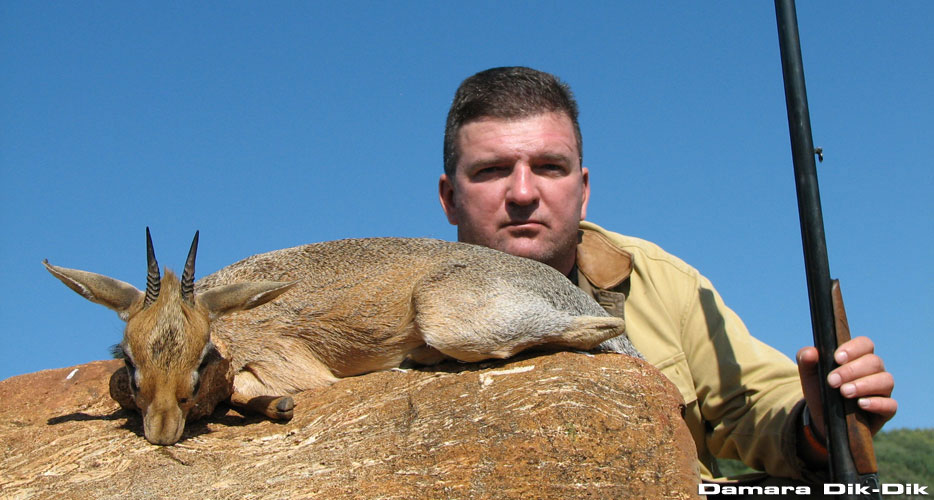
Hunting properties range in size from private land of a few thousand acres to million acre hunting concessions where hunters can discover a country and its wildlife that are among the most beautiful, varied and rich that Africa has to offer. The hunting areas are spread throughout the country from north to south. In the vast majority of cases, these are private areas managed by their individual owners or more professional larger hunting outfits.
The majority of the hunting in Namibia takes place on private game ranches which are found throughout the country. Safari hunting is allowed on private game ranches, conservancies where hunting is permitted and within government hunting concession areas which are only found in the North of the country.
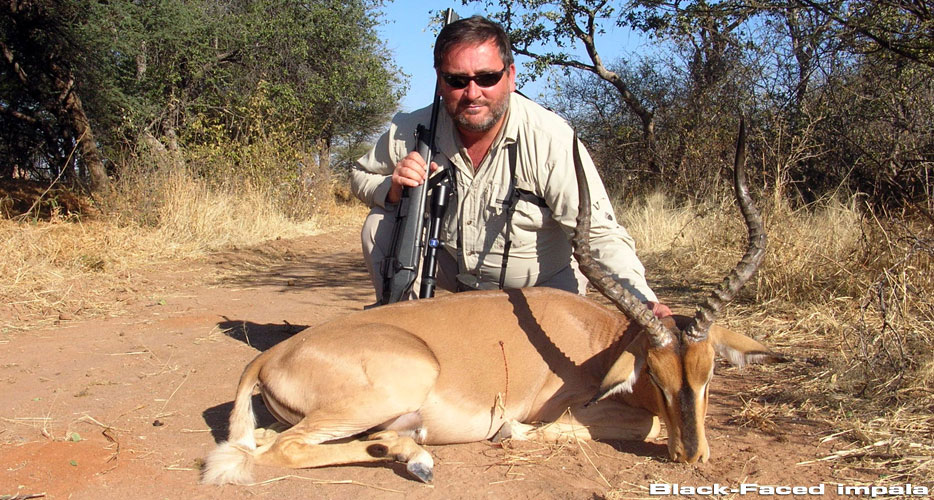
In Namibia, the habitat of the hunting areas is composed of dense thorny savanna, shrub savanna and large semi-desert plains. The terrain in some hunting areas can be challenging, even mountainous. The relatively high elevation of the central plains in much of the country where many of the prime hunting areas are located can also cause hunting to be more strenuous for those who are not used to it.
Namibia along with South Africa are the only two countries in Africa where one can hunt the entire big five; Lion, Leopard, Buffalo, Elephant and Rhino (White as well as Black Rhinoceros). Most of the plains game hunting safaris, as well as Leopard hunting, take place in the lower two thirds of Namibia. Leopards which can be found in many areas are hunted using bait. The use of dogs for hunting leopard is no longer permitted in Namibia. Lion, Buffalo, Elephant and Rhino are hunted on a limited basis and primarily in the Northern most part of the country, including the Caprivi Strip. Cheetah can be found throughout Namibia and can also be hunted.
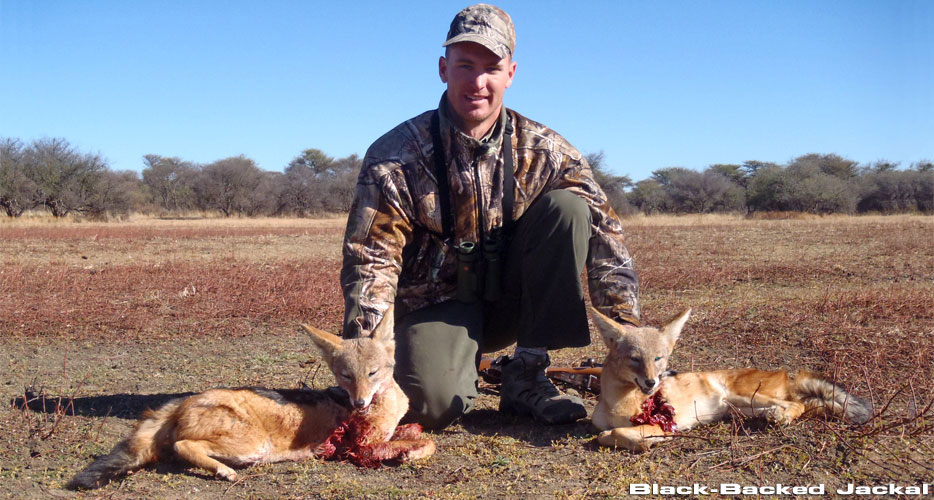
Namibia is most well known for the availability of numerous species for plains game hunting. The most famous and emblematic animal of Namibia, the Oryx, is found throughout Namibia. The following species are also found in abundance in Namibia; Cape Eland, Greater Kudu, Blue Wildebeest, Black Wildebeest, Blesbok, Impala, Steenbok, Klipspringer, Springbok and Warthog.
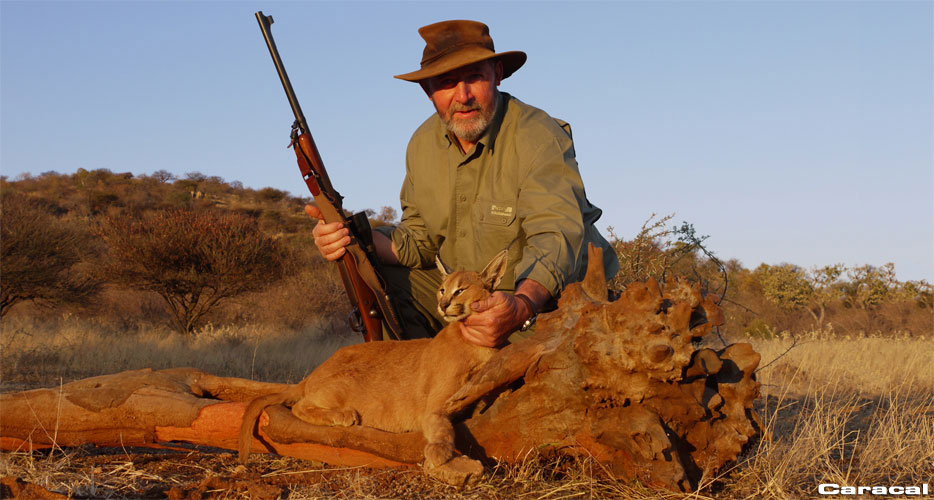
Trophy hunting may take place from half an hour before sunrise until half an hour after sunset during the hunting season and no hunting is allowed with artificial light. In Namibia hunting from a vehicle is permitted. There is no regulation controlling the number of days that a hunting safari must be, if there is a minimum it is set by the hunting outfitter.
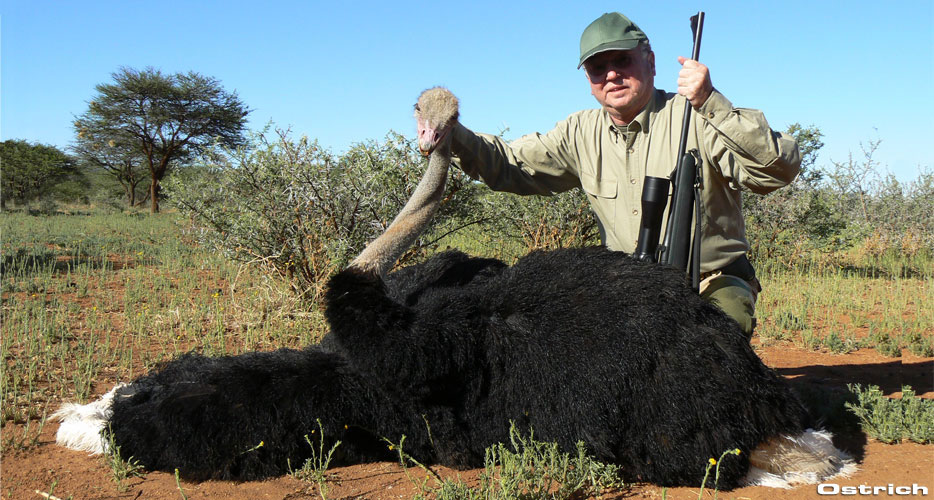

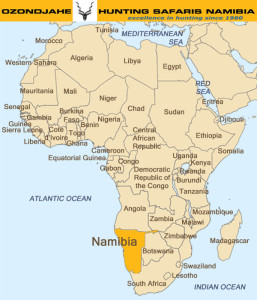
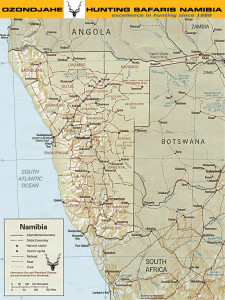
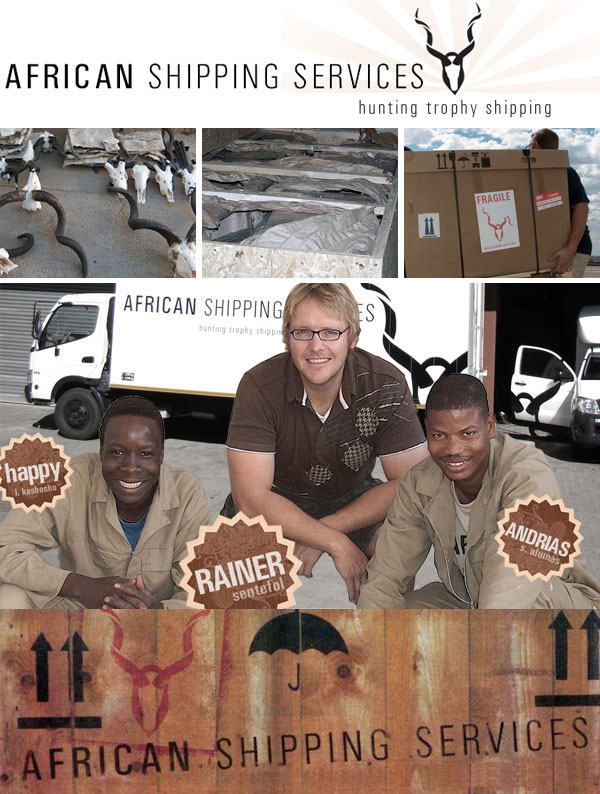
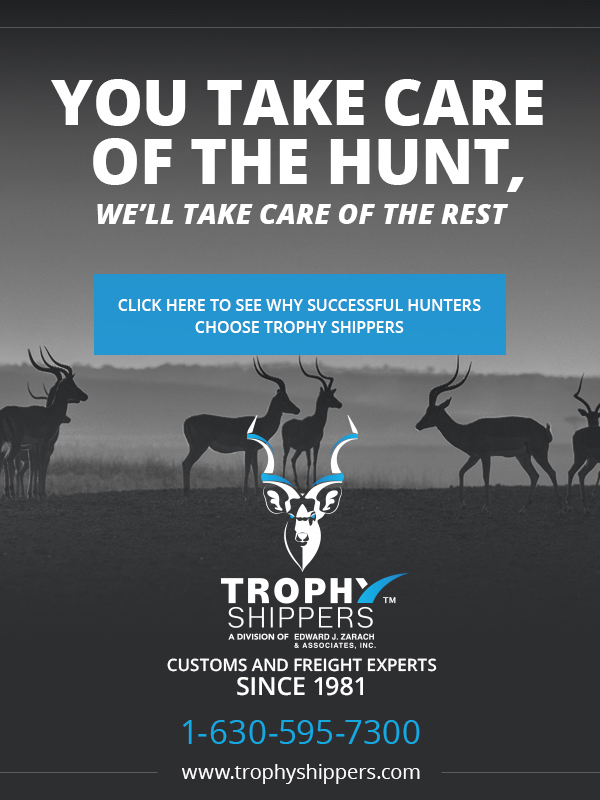
 africahunting
africahunting